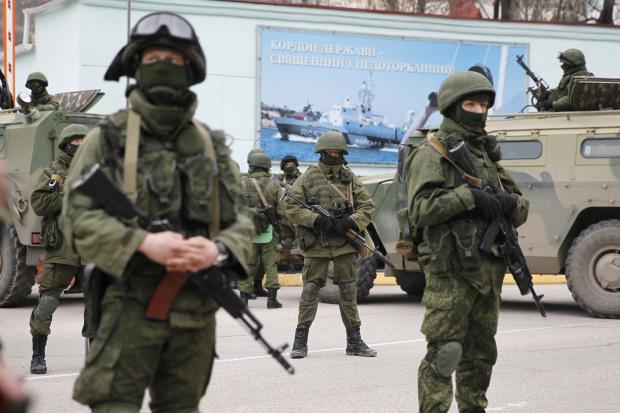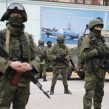
Kremlin Refuses to Tolerate Any Dissent Over Its Ukrainian Policy
Publication: Eurasia Daily Monitor Volume: 11 Issue: 48
By:

Moscow is preparing to legalize the annexation of Crimea as soon as possible. A special constitutional amendment is being rushed through parliament. To enact a “constitutional law,” all regional legislatures of the Russian Federation must state their opinion, but since all of them are controlled by the ruling United Russia party, this may only take a day or two (https://www.interfax.ru/print.asp?sec=1448&id=363460). Despite continuing Western diplomatic pressure, Vladimir Putin unequivocally supports the swift integration of Crimea into Russia. On March 6, the local Crimean legislature—the Supreme Council—voted to join Russia and hold a snap referendum on March 16, to confirm this decision. On March 11, the same legislature declared independence from Ukraine to “join Russia as an independent republic.” The pro-Moscow speaker of the Crimean Council, Vladimir Konstantinov, explained the independence declaration was a technicality “to help legitimize the accession to Russia” (https://www.interfax.ru/print.asp?sec=1446&id=363856).
The outcome of the Crimean referendum is a foregone conclusion, with most of Crimea controlled by Russian troops and pro-Moscow “Cossack” militias. There are Ukrainian military garrisons in Crimea that are still loyal to the government in Kyiv, but they are being tightly blockaded by the Russian soldiers and local militias. This standoff between the Russians and remnants of the loyal Ukrainian military may continue until the referendum is over. Then Moscow may begin to force the Ukrainian troops out of Crimea, stripping them of their armaments and equipment. The Crimean Tatars, evicted by Josef Stalin and allowed to return as the Soviet Union collapsed, are mostly opposed to Russia grabbing Crimea, and the Kremlin has gone to great lengths to neutralize them. Putin specifically invited to Moscow the Tatar leader Mustafa Cemilev, who is at present a deputy of the Ukrainian Rada in Kyiv, and had a half-hour phone call with him. According to Cemilev, Putin recognized his opposition to Crimea joining Russia, but asked “to refrain from provocations” until after the March 16, referendum and promised no one will “provoke” the Tatars. Putin reportedly questioned the legality of Ukrainian independence, declared as the Soviet Union disintegrated in 1991 (https://tvrain.ru/articles/krymskie_tatary_ne_priznajut_prisoedinenija_k_rossii_itogi_razgovora_mustafy_dzhemileva_s_vladimirom_putinym-364895/).
Russia is brushing aside the threat of Western sanctions. Deputy Minister of Economic Development Alexei Likhachev told journalists in Moscow: “We are ready to meet any threat, but hope these will be targeted political sanctions—not wide-ranging trade and economic measures” (https://www.interfax.ru/print.asp?sec=1447&id=364389). The speaker of Russia’s Federation Council, Valentina Matviyenko, told journalists she is not afraid of the West imposing visa restrictions: “I will go to Russian resorts, like Sochi, instead” (https://www.interfax.ru/print.asp?sec=1448&id=363938).
Putin’s aggressive stand is supported by the majority of Russia’s populations and his personal ratings have been growing as the crisis develops. The Kremlin propaganda machine, led by state-controlled TV channels, seems to be working fine. According to an independent Levada Center poll published this week, 63 percent of Russians believe the Russian federal media is impartially reporting the developments in Ukraine. Sixty-two percent believe there is chaos in Ukraine and no legitimate authority, while 15 percent believe ousted Viktor Yanukovych is the “legitimate Ukrainian president.” Only 11 percent believe the interim government in Kyiv is legitimate. An intervention of Russian soldiers in Crimea and “other Ukrainian regions” is supported by 58 percent. Some 71 percent believe Russians are being threatened in Ukraine or their rights are violated; and if Crimea or “any other Ukrainian region vote in a referendum to join Russia,” 79 percent say they must be accepted (https://www.interfax.ru/print.asp?sec=1448&id=364394).
The Russian defense ministry has announced its forces are being deployed on the borders of Ukraine and are undergoing intensive field exercises to prepare the men and commanders for action “on unknown territory” against a dedicated enemy. Large amounts of live ammunition are being used and the exercises are “simulating real combat as close as possible.” The exercises are planned to go on until the end of March (https://function.mil.ru/news_page/country/more.htm?id=11908837@egNews). Some 1,500 paratroopers of the elite VDV have been air-dropped together with light armor by 15 Il-76 transport planes in the Rostov oblast close to the Ukrainian border. In all, some 4,000 elite VDV troops will be deployed in this exercise, 36 aircraft and some 500 pieces of heavy military equipment. The main announced objective is to prepare “inter-service cooperability” capabilities (https://www.interfax.ru/print.asp?sec=1448&id=364315). Reportedly, six Su-27 jet fighters, together with Russian ground personnel, have been air-lifted and deployed to a Belarusian airbase in Bobruisk north of Kyiv (https://www.interfax.ru/print.asp?sec=1446&id=364447).
On March 11, Yanukovych briefly appeared before the press in Rostov, announcing he is still the “legitimate Ukrainian president” and, as commander-in-chief, orders Ukrainian troops not to obey the new authorities in Kyiv. Yanukovych promised he will soon return to Kyiv as “president” (https://www.interfax.ru/print.asp?sec=1446&id=363834).
The Kremlin-connected flamboyant nationalist demagogue Vladimir Zhirinovsky supported this seemingly incoherent Yanukovych statement by announcing: “Yanukovych is president and commands the troops. Russian must use its armed forces to reinstate Yanukovych in his residence in Kyiv.” Zhirinovsky sometimes accurately describes in public what Putin says and plans behind closed doors. On February 24, Zhirinovsky announced: “Russia will send troops into Crimea to guard our Black Sea fleet,” which indeed happened several days later (see EDM February 27).
Russia seems to be increasingly on a war footing as the VDV and the air force are preparing to spearhead a possible push deep into Ukraine to take much more than Crimea. The lightly armed VDV must be closely followed by army brigades with lots of heavy guns and tanks, and this “inter-service cooperability” is being tested in a series of military maneuvers. Martial law has not been declared in Moscow, but the remnants of independent media are being restricted. Russia’s only independent cable news TV channel Dozhd has been under attack, accused of “extremism” (see EDM, February 6). One of the few remaining popular outposts of free speech—Ekho Moskvy radio—may lose its independence (see EDM, February 20). This week, the chief editor of one of Russia’s most popular news internet sites lenta.ru, Galina Timchenko, was arbitrarily fired by the owner—tycoon Alexander Mamut—several hours after the authorities accused the website of “extremism” for publishing an interview with little-known Ukrainian nationalist Andrei Tarasenko. The new chief editor of lenta.ru is Alexei Goreslavsky, a former chief editor of a Kremlin-financed and aggressively pro-Putin nationalistic internet news site Vzglad.ru. Most leading staff and journalists from lenta.ru are publicly protesting the sacking of Timchenko, and some 30 have already resigned in protest (https://www.interfax.ru/russia/364340). The Russian public has been effectively brainwashed to support a possible invasion of Ukraine, and the Kremlin wants to keep it so.




